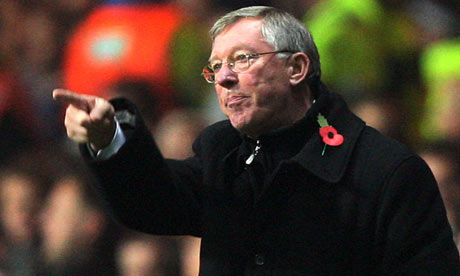
Sir Alex Ferguson reaches another personal milestone tomorrow when he makes it 50 years in the game but, amid all the sepia‑tinted memories, the oldest manager in the business found himself sidetracked tonight by the very modern-day issue of a footballer not being satisfied with a weekly salary already in excess of £120,000.
The player in question is Cristiano Ronaldo, whose management company, Gestifute, announced this week that the Portugal midfielder deserved an improved wage from Manchester United "that marks his performances on the field". Jorge Mendes, Ronaldo's agent, was in Manchester on Monday and, although reports of it being to instigate contract talks were inaccurate, a spokesman for Gestifute said it was reasonable to "predict a meeting" with United in the near future.
The suggestion has bemused Manchester United's chief executive, David Gill, and as Ferguson reminisced about his first ever match - on November 15 1958 - he, too, seemed unimpressed that the subject of Ronaldo's pay should have resurfaced. "I don't know what other clubs pay their players but Ronaldo is very well paid by us," he said. "At the moment he has three and a half years left on his contract and we are happy with that."
Ferguson revealed the contrast with his early playing days, when he combined football with working as an apprentice toolmaker and earned so little his family considered emigrating to Canada because of its "great trade". His debut was for Queens Park at Stranraer, a 2-1 defeat he remembered descending into "warfare" after he had been bitten by the "little tank" who was marking him.
"We were amateur footballers and people always thought we would be doctors, teachers and professionals and nice namby-pamby players when, in fact, we were as tough as nails," he recalled. "That was my lesson. At half-time I wasn't doing that well and [the coach] Jackie Gardiner said: 'What's wrong with you? Bite him back.' That was the way it was at Queens Park. You didn't sidestep people. You went through them."
Whatever Stranraer put up in return, however, Ferguson never came up against a team whose artillery included the cannonballs otherwise known as Rory Delap's long throw-ins. Stoke City are the visitors to Old Trafford and Ferguson revealed his players had worked in training specifically to defend against the "formidable threat" of Delap.
"We can't dismiss the fact that it is an absolute threat to us," he said. "We've done some work on it, we've done some video analysis too, but it is another thing to try to stop it. I remember saying to my players against one team, 'Don't give corner-kicks away'. And the opposition got a corner-kick in the first minute and scored. So it's no good saying, 'Try to stop throw-ins' because it is impossible. There will be throw-ins and we will just have to deal with them the best we can."
On the subject of drug-testing for footballers, Ferguson claimed the proposed new procedures would cause Premier League clubs a major logistical headache. The game's move to join other Olympic sports by introducing random testing means that players will have to give their whereabouts for one hour each day.
"It is becoming a real nuisance. You have to notify the FA where that player will be for one hour that day so if they want to test them or see them they know the address," he said. "There are occasions where you look at your team and think, 'Maybe I will give them this day off'. We then have to start notifying the FA that the players are not in training and give them addresses where they might be.
"What if Ronaldo or Nani want to go back to Portugal for a day? It is very difficult. It goes without saying we want to keep drugs out of our game but this scheme will cost the FA a fortune and the implementation will be very difficult."

